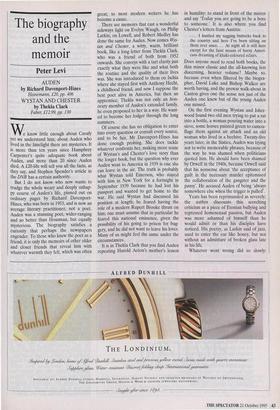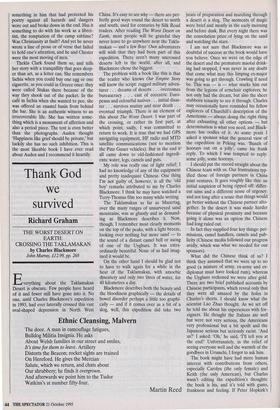The biography and the memoir
Peter Levi
AUDEN by Richard Davenport-Hines Heinemann, £20, pp. 406 WYSTAN AND CHESTER by Thekla Clark Faber, £12.99, pp. 130 We know little enough about Cavafy yet we understand him; about Auden who lived in the limelight there are mysteries. It is more than ten years since Humphrey Carpenter's quite adequate book about Auden, and more than 20 since Auden died. A £20-life will tell you all the facts, as they say, and Stephen Spender's article in the DNB has a certain authority.
But I do not know who now wants to trudge the whole weary and deeply unhap- py course of Auden's life, pinned out on ordinary pages by Richard Davenport- Hines, who was born in 1953, and is now an average literary practitioner, not a poet. Auden was a stunning poet, wider-ranging and so better than Housman, but equally mysterious. The biography satisfies a curiosity that perhaps the newspapers engender. To those who knew the poet as a friend, it is only the memoirs of other older and closer friends that reveal him with whatever warmth they felt, which was often great; to most modern writers he has become a cause.
There are memoirs that cast a wonderful sideways light on Evelyn Waugh, on Philip Larkin, on Lowell, and Robert Medley has done the same for Auden. Now comes Wys- tan and Chester, a witty, warm, brilliant book, like a long letter from Thekla Clark, who was a friend of both from 1952 onwards. She conveys with a tart clarity just exactly what they were like and what both the routine and the quality of their lives was. She was introduced to them on Ischia where she stayed first with Anthony Hecht, a childhood friend, and now I suppose the best poet alive in America, but then an apprentice; Thekla was not only an hon- orary member of Auden's extended family, he even proposed to her in a way. He want- ed to become her lodger through the long summers.
Of course she has no obligation to enter into every question or consult every source, and to be fair, Mr Davenport-Hines has done enough probing. She does tackle whatever confronts her, making more sense of Wystan's and Chester's love story than the longer book, but the question why ever Auden went to America in 1939 is one she can leave in the air. The truth is probably what Wystan told Emerson, who stayed with him in New York for a fortnight in September 1939 because he had lost his passport and wanted to get home to the war. He said Wystan had discussed his position at length; he feared having the role of a modern Rupert Brooke thrust on him; one must assume that in particular he feared this national eminence, given the possibility of his going to prison for bug- gery, and he did not want to leave his lover. Many of us might feel the same under the circumstances.
It is in Thekla Clark that you find Auden repeating Harold Acton's mother's lesson in humility: to stand in front of the mirror and say 'Today you are going to be a bore to someone.' It is also where you find Chester's letters from Austria:
I hustled my sagging buttocks back to the country and here I've been sitting on them ever since... At night all is still here except for the faint moans of horny Ameri- cans dreaming of khaki-coloured eclairs.
Does anyone need to read both books, the thin minor classic and the all-knowing less discerning, heavier volume? Maybe so, because even when filtered by the biogra- pher, David Luke and Bishop Walker are worth having, and the prewar walk-about in Canton gives one the sense not just of the Auden one knew but of the young Auden one missed.
On the first evening Wystan and Isher- wood found two old men trying to put a rat into a bottle, a woman pouring water into a sieve, some horses painted green to camou- flage them against air attack and an old woman who lived in a beehive. Twenty-five years later, in the Sixties, Auden was trying not to write memorable phrases, because of the way he was shamed when politicians quoted him. He should have been shamed by Orwell in the 1940s, because Orwell said that his nonsense about 'the acceptance of guilt in the necessary murder epitomised the collaboration of the gangster and the pansy'. He accused Auden of being 'always somewhere else when the trigger is pulled'.
Yeats has been reprimanded as severely; the author discounts this scorching criticism as a piece of Etonian bullying and repressed homosexual passion, but Auden was more ashamed of himself than he would admit or than his disciples have noticed. His poetry, as Larkin said of jazz, used to enter the ear like honey, but not without an admixture of broken glass late in his life.
Whatever went wrong did so slowly: something in him that had protected his poetry against all hazards and dangers wore out and broke down in the end. Has it something to do with his work as a libret- tist, the temptation of the camp sublime? Was Christianity at fault? And yet he never wrote a line of prose or of verse that failed to hold one's attention, and he and Chester were the most moving of men.
Thekla Clark found them so, and tells her story with a tranquillity that goes deep- er than art, as a letter can. She remembers Ischia when you could buy one egg or one cigarette, as you could in Greece once: they were called Stukas there because of the way they shook out of the packet. In the café in Ischia when she wanted to pee, she was offered an enamel basin from behind the bar. She is an authentic witness to an irrecoverable life. She has written some- thing which is a monument of affection and also a period piece. The text is even better than the photographs. Auden thought `Happiness like grief should be private,' but luckily she has no such inhibition. This is the most likeable book I have ever read about Auden and I recommend it heartily.











































































 Previous page
Previous page